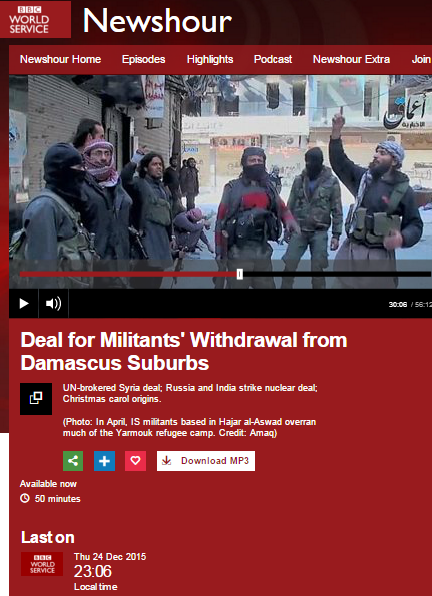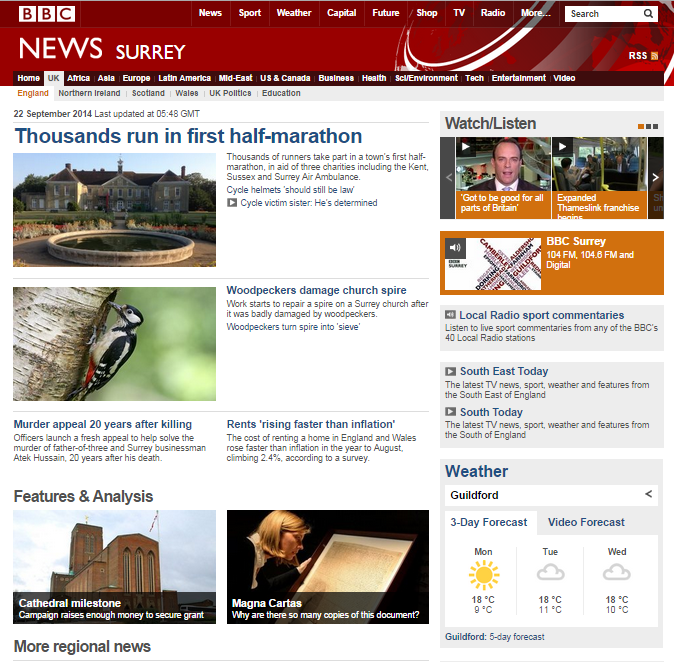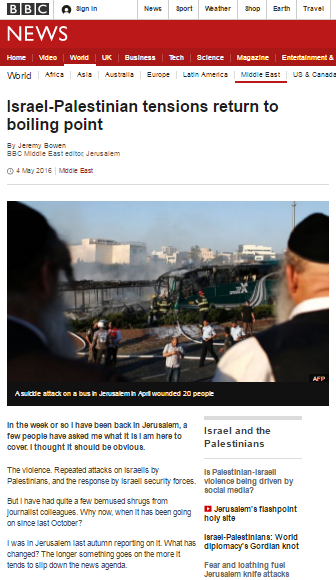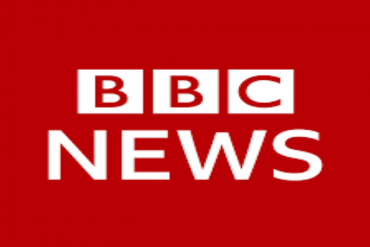In addition to the politicised Christmas Eve feature produced by Yolande Knell for the BBC News website on December 24th, she also reported from Bethlehem for BBC World Service radio’s ‘Newshour’.
In that item (from 30:00 here) Knell recycled themes and interviewees seen in her other report, focusing on a low-key Christmas and economic hardship in Bethlehem. Once again audiences were not informed of the Palestinian Authority’s instructions to municipalities to dampen this year’s celebrations or the Council of Churches’ similar dictate.
Setting the scene in his introduction, presenter Tim Franks failed to adequately clarify to listeners exactly which party has been initiating the acts of violence seen over the last three months, using passive language to promote a false sense of equivalence and – through use of the ‘Israel says’ formula – implying that the BBC cannot independently confirm that most of the Palestinian casualties were either terrorists killed in the act or violent rioters. [emphasis added]
“Even as visitor numbers continue to dwindle Christmas upon Christmas, this year the reason is pretty clear: the tensions that have washed over Israel and the occupied territories show no sign of abating.”
“More than 130 Palestinians have been killed – more than half were said by Israel to be attackers.”
“In Bethlehem – a short distance to the south of Jerusalem in the occupied West Bank – confrontations between young Palestinians and Israeli soldiers continue on an almost daily basis….”
Of course if no Palestinian rioters take to the streets, there are no “confrontations” but as usual, the BBC conceals cause and effect and Knell’s later description did little to help listeners understand the context of the violence either.
“But for weeks now this has been the sound on the streets. An Israeli jeep fires tear gas at the young Palestinians all around me. They’ve been using catapults to fling stones at the Israeli soldiers next to the high concrete wall here: part of Israel’s West Bank barrier.”
As in her written report, Knell provided a platform for opportunistic political messaging. [emphasis added]
Knell: “Back at the road where protests regularly break out in Bethlehem, I meet a priest: Father Jamal Khader.”
Khader: “Now more than ever we see more despair. People don’t believe any more in the two state solution with increase of settlements, with heavy presence of the Israeli army.”
That messaging compliments Knell’s later portrayal of the background to the ongoing wave of terror.
“Israel blames the recent violence on incitement by Palestinian leaders and social media but Palestinians say it stems from the lack of hope after the failure of years of peace efforts.”
More than three months into this wave of terror, the BBC has still not provided its audiences with a factual and comprehensive picture of the incitement underpinning the violence. As a result, BBC audiences are not in a position to be able to determine the relative merits of the Israeli and Palestinian claims paraphrased in this item – which have also appeared in previous reports from Knell and her colleagues.
As readers may recall, the PLO’s guidance document distributed in November to members of the international media under the title “Key Points to Remember when Reporting on Occupied Palestine“ states:
“The Israeli government attempts to shift the focus away from their colonization enterprise and illegal occupation, which is the root cause of the continuous uprisings of the Palestinian people who have for decades endured an Apartheid regime. Though Israeli spokespeople have claimed that the main issues are Al-Aqsa and “Palestinian incitement”, the fact of the matter is that Israel continues to systematically deny Palestinian rights.”
It therefore becomes increasingly difficult to avoid reaching the conclusion that BBC journalists have indeed chosen to ‘remember’ those ‘key points’ and to keep audiences in the dark on the topic of Palestinian incitement whilst simultaneously refraining from informing them of the actual circumstances of “the failure of years of peace efforts” which include the PA initiated Second intifada, the PA’s rejection of Olmert’s 2008 peace offer and the PA’s decision to scupper the round of talks held in 2013/14.
The corporation asserts that its audiences “can expect the BBC to keep them in touch with what is going on in the world” and that its priority is to “build a global understanding of international issues”. A media organization committed to doing that could not have systematically avoided informing its audiences about the incitement fueling a wave of terror attacks and violence which has been going on for over a hundred days.




